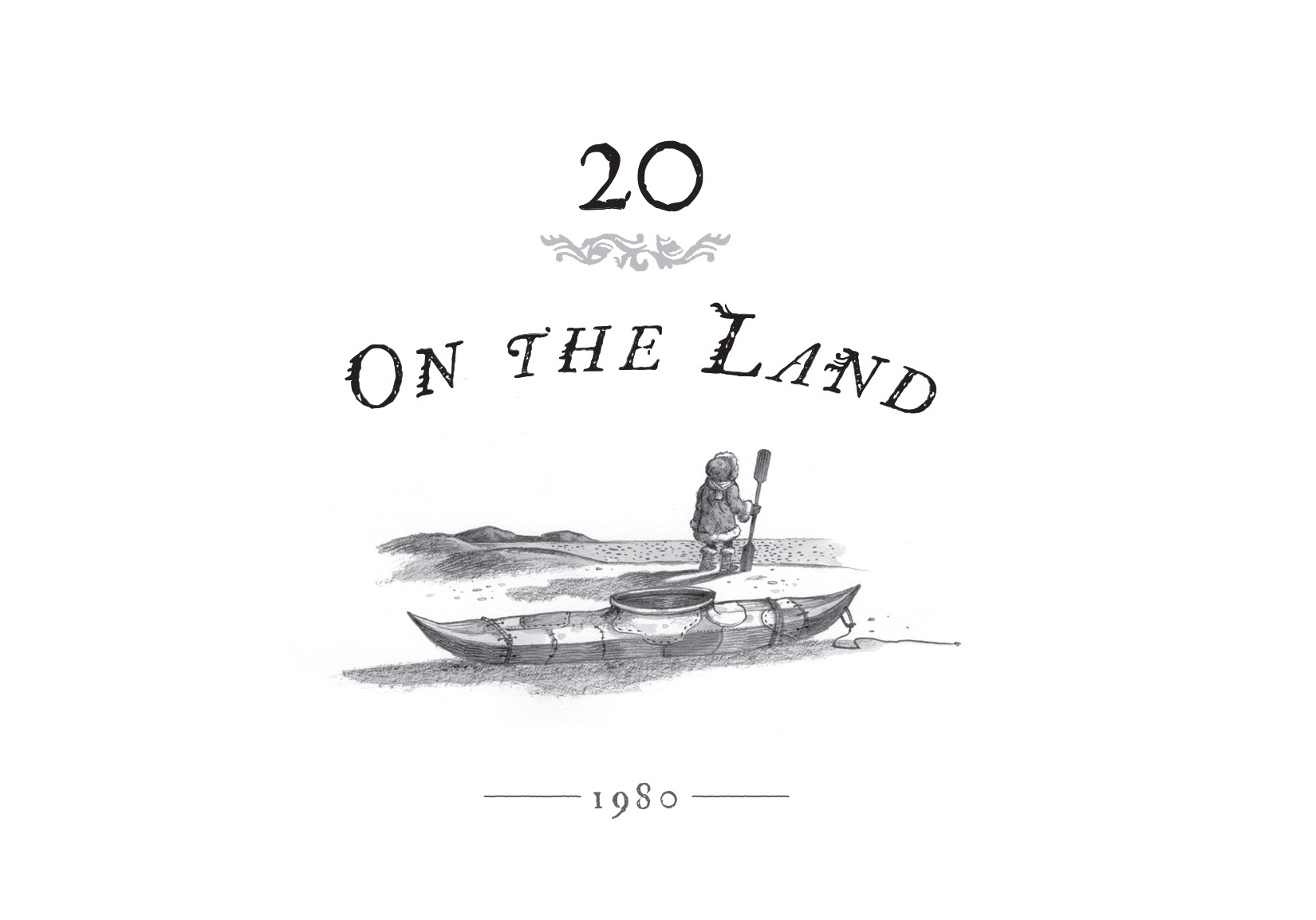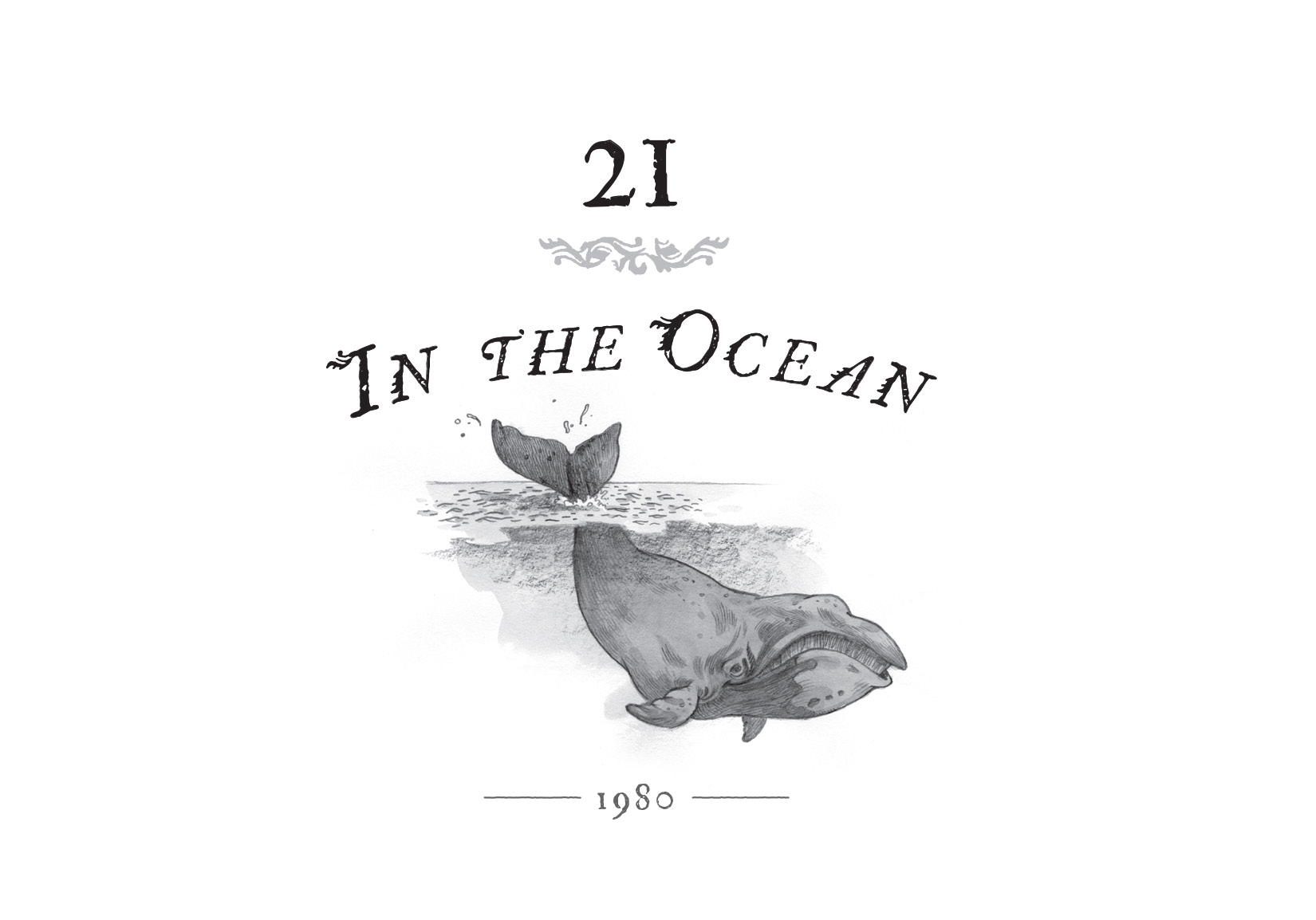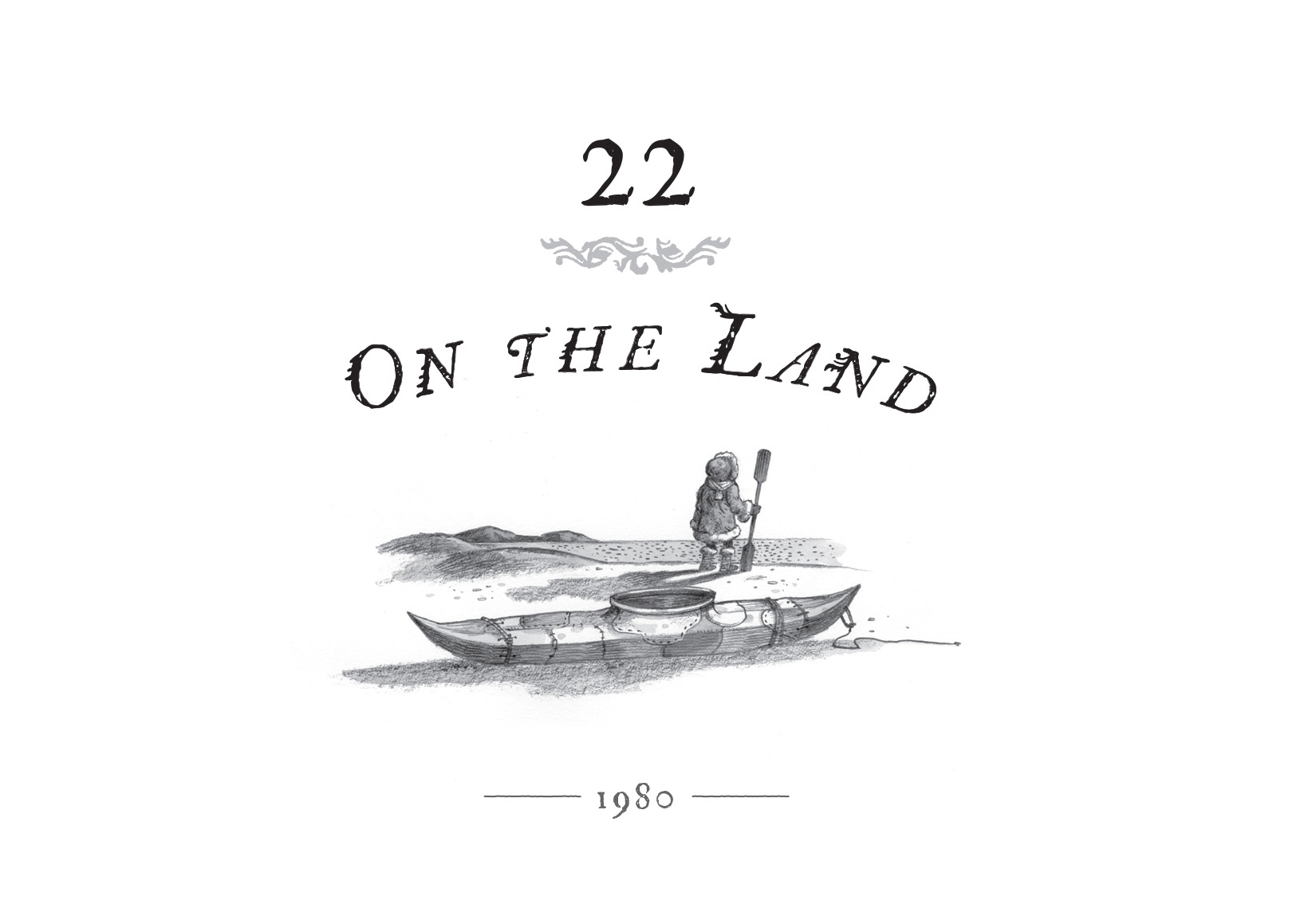Ice Whale (14 page)
Authors: Jean Craighead George


H
ours passed. Emily Toozak lay still and cold on
the ice floe. Silentlyâ Siku stayed with her and was pushing her and the ice floe with his rostrum. It rode up on a shoal near the beach and crunched to a stop.
The jolt woke Emily. She saw she was groundedâ ran to the edge of the floeâ and excitedly jumped off. Frightened but glad to be on landâ she instantly wondered where she was. The land around the bay looked like the land around Barrowâ but she knew it could be almost anyplace on the north coast of Alaska.
Whoosh!
She heard the unmistakable sound of a whale blow. The whale was near the shore. Rising to her toesâ she rubbed her eyes and stared.
Another whooshâ then another and four more. Fountains of mist rose and drifted away. There were many whales here. Emily Toozak ran down to the beach to watch them.
One of them breachedâ fell over backwardâ andâ after a monumental splashâ raised his fluke. Then he lifted his head out of the water. There was a white mark on his chinâthe dancing Eskimo.
“Siku! You are Sikuâ” she shoutedâ clapped her handsâ and ran down to the water's edge to watch him. His eighty-ton body was as graceful as the small ivory gull above her. She smiled and wrote
Siku
in the gravelly beach as if the word would hold him there.
Then Emily Toozak halted. Looking out at the dark shape in the waterâ she realized the impossible truth. Siku had pushed her ice floe to land.
“Thank you!” she called outâ her voice shaky and rough. Tears welled up in her eyes. Siku had saved her life.
As she turned her backâ her Arctic instincts took over. Snuggling her parka hood up against her faceâ she closed her eyes to better think what to doâ then opened them and drew a deep breath.
I hope I run into a hunter or travelerâ
she thought.
Walking up the beachâ she waved good-bye to Siku as she reached the tundra and began searching the thawing landscape for a sign of human life. Grasses and lichens rolled out to the horizon. Wildflowers were just beginning to bloom. The scene was a beige-and-white carpet reaching to the very curve of the earth. She could not walk that endless space without food. How would she get it?
Water was no problem. The land had hundreds of thawing freshwater ponds whose water was drinkable. The problem was food.
Emily Toozak climbed a frost heaveâ a bump of land raised into a hill by the freezeâ and tried to locate a village. Instead of a villageâ she saw the wreckage of an old schooner tossed up on the bay's beach. It was all that was left of some white men's attempt to get through the Northwest Passage.
The schooner lay on its sideâ its wave-battered deck standing almost vertical. Emily Toozak scrambled over ice blocks and black beach stones to get to it. She grabbed the broken deck boards and climbed to a door. Peering through itâ she saw the ship's galley. It too was tipped on its side and empty.
“Salvagedâ” she saidâ disappointed. “They must have taken everything when they abandoned ship.” Thenâ thinking that the ship's crew might have drowned in the icy watersâ she had another thought.
Or did my people find the ship and take everything? I hope so. That might mean I am not too far from a village. But where?
Deciding to hunt for some overlooked scrap of food in spite of the bareness of the shipâ she teetered onto one of its wallsâ now a floor.
“Pilot-bread crackersâ cans of some kind of meatâ beansâ anything would be great.” She picked her way around the ruins of the kitchen and into the pantry.
Empty.
Her heart sank. In discouragementâ she flopped down on a battered mattress. Beside it was a ripped blanket. Getting quickly to her feetâ she dragged them both to the vertical deck and tossed them down to the beach below. A cooking kit rolled out of the blanket onto the sand.
“Goodâ” she said. “I can cook . . . if I had matches.”
Her brow furrowed.
“How did my ancestors make fire? I'm sure I've been told. Thinkâ thinkâ think.” She clambered over the wreck and climbed down to the mattress.
With the blanket she made a shelter by tying it to some broken boards on the ship and pulling the mattress under itâ just in case any summer snowstorms should come.
“Maybe a plane will fly by from the oil fields . . . but how do I signal it? Maybe I could use the blanket as a flag.”
Whoosh
. Emily Toozak turned. A great whale was swimming slowly through the clear icy water. He was feeding in the bay.
“I wish I ate planktonâ” she sighed. “Heyâ maybe I canâbut I'll get wet trying. That idea's no good.”
“You are good companyâ“ she called to Siku.
He thrust up his rostrumâ blew mistâ and disappeared.
Exhausted and discouragedâ Emily Toozak lay down on her mattress and instantly fell asleep.

When Emily awoke hours laterâ the tide was out. Although there is only a small difference between high and low tide in this part of the worldâ a high tide had brought some rare kelp to her beach from somewhere nearby. Torn from its moorings by a stormâ riding the waves and swellsâ it had been deposited on the beach by the low tide.
“I must be nearer to Barrow than I thoughtâ” she said. “All of the same creatures are here.”
Gingerly she took a small bite of the kelp bladeâand waitedâ recalling her father's words: “Take a little biteâ and if it's not bitter it's edible.” The kelp was drab and salty- tastingâ but it was not bad. Emily ate a handfulâ then went back to the ship to look for something to carry it in. The salty weed made her thirstyâ so she went back to her ice floe. She remembered having seen patches of old sea iceâ called
piqaluyak
â [Pea-kal-lu-yak] on it. Her family drank melted
piqaluyak
. It was saltlessâthe most delicious water she ever tasted. She picked up the cooking kit's pot-like lidâ climbed on the ice floeâ and went right to the old ice. The dome shape of the ice told her that it was one or more years oldâ but it was fresh and drained of salt. Chipping out several piecesâ she sucked on them until she was no longer thirsty. The rest she put in her cooking pot. It was too cold for it to melt. She ran back to her mattress camp.
“Thank youâ Siku. You have led me to food and water.” She laughed. “And
I
was supposed to save
you
.”
Having eaten and drunkâ she thought about how to get home. The modern life of the Eskimo had not taught her how to live off the land.
“Andâ” she saidâ “there will be no Siku on the land to guide me . . . Or will there?”

B
efore he left Smith Bayâ had
had
lingered as if caught in some shaman wizardry. He had seen the girl on the beach when he'd held his head out of the water by pumping his flukes. Now he rose again and looked. After many secondsâ he threw himself backward.
BOOM! He came up headfirst. The girl turned around and smiled. He looked into her eyes. Something otherworldly passed between the eighty-ton whale and the girl with the kind eyesâ eyes like others he had known. Siku recognized the same feeling he'd had when they first saw each otherâ after she and her brother had scrambled down the ice pack in Barrow. Laterâ she had saved himâ and then he knew he must save her.
“Sikuâ you're with meâ” she called. “You have brought me here. I'll make it.”
 sank back into the waterâ and turning onto his bellyâ joined a group of whales. The girl turned her boots west and walked down the beach.
sank back into the waterâ and turning onto his bellyâ joined a group of whales. The girl turned her boots west and walked down the beach.
Emily Toozak and Siku were one spirit.

S
iku met three other whales and swallowed five
hundred pounds of plankton. They were headed for deeper water. The sun was circling the earth just above the horizon. In its gold light Siku spy hopped as if to check on Emily Toozakâ then dove and swam out of Smith Bay.
Emily Toozak was also ready to leave the bay. She gathered a few things from the ship that might be useful on her tripâ including a wooden boxâ and put them in her blanket. Taking a deep breathâ she swung the blanket on her backâ tied the ends around her chestâ and left the battered wreck.
She heard a thunderous
whoosh
 . . . and turned around. A whale spy hoppedâ doveâ and slowly lifted its great head. The figure on its chin was a dancing Eskimo manâ hands upâ knees bent and far apart. She waved. “I'll see youâ Siku. I am wellâ” she calledâ and began to walk.
A familiar voice traveled clearly to Siku. Then he heard a chorus of shrieksâ tingsâ and roars. The sounds were calling himâ telling him the route to the next good feeding area.
Emily Toozak sighed as she watched Siku's footprints leave the bay.
Frightenedâ she sat back down. Thenâ like some spirit out of a shaman's brewâ a gossamer wind of mist blew over her. Although she was aloneâ she no longer felt afraid.
Sikuâ that's you
â she imagined.
I feel you. You are with me. I am all right now.
She lightly brushed her cheek with her hand.
She stood up and started on her journey.
“Sikuâ” she said to the mistâ “I will find berries on the tundra and ground squirrels in the grass. I am an Eskimo.” She left the beach and stepped onto the seemingly endless tundra.
After a few stepsâ she gaspedâ wiped her eyesâ and stared. “Is that somebody walking toward me?” The figure vanished in the sun.
“It's just a mirageâ” she sobbed.
“Ei eeee.”
A misty wind blew softly against her face. Againâ she touched her cheekâ and became calm.
“Sikuâ” she said. “You're with me. I will be all rightâ” she repeated. It was a refrain she would say over and over.
